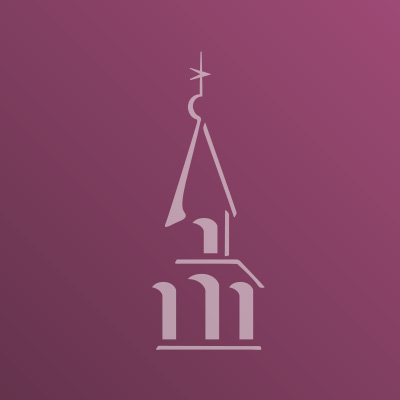
Illustrations by Jason Schneider
Pacific School of Religion has long been at the leading edge of social change and innovation, and its Lilly Pathways Phase III experiment in stackable credentials is extending its legacy in new ways. How a visionary board, an iconoclastic president, and an eclectic team of leaders is bringing new opportunities for ministry to theological education.
Pacific School of Religion (PSR) occupies the highest point on Holy Hill, the enclave of eight seminaries and theological schools of the Graduate Theological Union (GTU) in Berkeley, California. PSR President David Vasquez-Levy, D.Min., likes to direct visitors to a sidewalk traversing the quadrangle that leads to a steep staircase, carved out of ancient metamorphic rock and descending to one of the many winding streets of downtown Berkeley and its renowned public university.
The view from the top substantiates PSR’s address on Scenic Avenue: a spectacular vista of bustling Berkeley, and in the distance the skylines of San Francisco and Oakland, both flanking the San Francisco Bay and its twinned Golden Gate and Bay bridges. The area’s original 18th century Spanish mission settlers gave way to a 19th century Gold Rush boomtown, a diverse ethnic population, and intellectual and artistic vitality. Those beginnings established the complex DNA of the region, now a global nexus of technological innovation, rich cultural diversity, and social activism.
In this milieu, PSR has thrived. Founded by Congregationalists as Pacific Theological Seminary in 1866 in San Francisco, PSR moved to Berkeley in 1891, changed its name in 1916 to reflect its new non-denominational status, and was a founding member of the GTU in 1962. Students and faculty were at the forefront of the 1960s social upheaval, and enrollments peaked at around 350 students into the early 1970s, before beginning the same steady decline that has characterized much of theological education throughout North America in the last several decades.
In 2015, the PSR Board of Trustees called Vasquez-Levy as president. He was 45, with an undergraduate degree in Computer Science from Texas Lutheran University, a D.Min. in Homiletics from the Association of Chicago Theological Schools, and an M.Div. from Lutheran School of Theology at Chicago and Ludwig Maximilian University of Munich. His previous experience included academic, pastoral and ministerial roles in the Lutheran Church.
If he has not quite followed the traditional path of the academic CEO, Vasquez-Levy is unquestionably a creative thinker deeply grounded in liberation theology and pastoral work, fearless about charting a creative future for theological education, and eager to tap the intellectual and technological innovation of the Bay area.
PSR’s board has likewise shown bold aspirations for the future. Three years before Vasquez-Levy’s appointment, it released A Future Envisioned: Continuous Creation. The 40-page report included a frank assessment of declining enrollment and a call for renewed commitment to mission. It envisioned an educational model focused more sharply on social transformation; narrowing the scope of its M.Div. and M.A. programs while broadening programs for faith-based activists and entrepreneurs (including non-degree programs); online and hybrid learning to expand its reach globally; greater philanthropic support from socially progressive donors; and leasing or selling facilities to free funds for technology.
We made a deliberate choice to move away from a traditional curriculum sequence to offer stackable credentials that provide flexibility.

A preferential option
“There’s a lot of competition over a pie that has gotten very small,” Vasquez-Levy says in describing the enrollment challenges of theological schools. “Much of our energy has been trying to get a piece of the same pie. We are breaking each other in the process.”
He and the board envisioned a variation of the Vatican II Council’s “preferential option for the poor,” by which theological education would be democratized by turning away from “excellence by exclusion” and reinventing the curriculum.
“Our structures have been designed to educate the elite,” says Vasquez-Levy, a native of Guatemala who came to the U.S. at 17. “Ours is an attempt to reorganize around the needs of a particular set of groups that are actually the majority of the world, because that’s where the compensation needs to be made in terms of what our theology says, how it has been structured and delivered.
“We’re just trying to create little ladders for those people to come into what was not designed for them.”
Thus began an experiment in democratizing education, he says. The first ideation, Ignite, was a proprietary online platform of learning and community that began the unbundling of the traditional curriculum and its re-arrangement. Ignite (the name is derived from the Pentecost) enabled students to more flexibly stack discrete fields of theological study with “contextual education, cross-cultural immersion, spiritual formation, and professional development,” according to PSR’s website.
Students may earn certificates in either “Spirituality and Social Change” or “Sexuality and Religion” in the first year, and can then pursue an M.A. in Social Transformation in year two, followed by an M.Div. in the third year – all now accredited by the Association of Theological Schools (ATS).
Ignite has been supported by grants from ATS for the stackable curriculum, a Lilly Endowment Inc. Pathways For Tomorrow grant for a program supporting emerging leaders, and again in Pathways Phase III with $5 million to test and scale Ignite.
Coalescence
Vasquez-Levy has assembled a sympathetic (and intellectually and professionally diverse) team of leaders to advance the School’s evolving mission and to propel Ignite. Two years after becoming president, he recruited Susan Abraham, Ph.D., a native of India and a U.S.-educated Catholic theologian then on the faculty at Loyola Marymount University; she serves as Vice President for Academic Affairs and Dean of Faculty and is candid in describing her role and that of the faculty.
“We’re creating leaders,” she says. “We made a deliberate choice to move away from a traditional curriculum sequence to offer stackable credentials that provide flexibility. A student may earn a certificate such as Spirituality and Social Transformation, and then can think about planting a church or responding to a vocational call to congregational ministry if they need to go to work. Or they can stack a Master of Arts in Social Transformation on that, and then an M.Div.”
The new curriculum is accredited by ATS, which made a grant in 2017 to help develop it, Vasquez-Levy says. He acknowledges that “our early efforts to introduce stackability were met with significant resistance at the School, and also in the broader conversations with peers in accreditation. This was less the case with the regional accreditation; they were seeing it in other disciplines.”
Three years after Abraham arrived, Byron Chung joined PSR as Executive Director of Ignite Institute. Chung had spent 18 years as president of two for-profit colleges on the West Coast, which familiarized him with start-up mentality and turnarounds. “Private institutions are constantly innovating and inventing,” he says. “This idea of new audiences and new ways to reach them is not new to me; I’ve lived it for almost 30 years.”
The week after he started his new position, the COVID pandemic emerged, adding urgency to PSR’s plans, Chung says. “In 2020, we launched a podcast called Change Happens Now, the first of its kind at PSR, focusing on four ideas: leadership in a new era of chaos and upheaval, innovation, social justice, and spirituality.”
Featuring leaders from a range of industries and seminaries, the podcast led to the development of discrete learning cohorts focused on three pillars of wisdom-based leadership: contemplative care, spiritual care, and collaboration, Chung says.
The podcast caught on, engaging a worldwide audience, and became the starting point for Ignite, Chung says. Within a few years, it had expanded as a distributed learning platform incorporating additional seminary partners, which offered their own academic content and discrete credentials.
“The idea is a community-based learning platform that broadens theological education to make it more accessible and more affordable, allowing faith leaders, educators, spiritual seekers to learn and grow through a flexible approach,” Chung says.
Private institutions are constantly innovating and inventing. This idea of new audiences and new ways to reach them is not new to me.

The Cathedral and the Bazaar
With the support of the Pathways Phase III grant, Ignite took a major leap forward and was re-launched as Kwaray (derived from the Latin word for “query”) in October 2024. Kwaray provides a “more powerful technology backbone for a distributed global network of collaborators, with a particular commitment to pastors and congregational lay leaders from emerging communities of color,” according to PSR’s proposal.
A significant feature of Kwaray is an invitation to other schools to utilize the platform for their own online programs; so far, Berkeley School of Theology (also a member of GTU) and Garrett Theological School in Chicago have joined. Per the grant proposal, no single partner will be at the center of the Kwaray ecosystem. A content and community incubator is provided to help schools adapt existing courses and content, and to learn best practices.
Vasquez-Levy likens the thinking behind Kwaray to the ideas presented in the 1999 Eric Raymond book The Cathedral & The Bazaar, which posits two different software development models: The “cathedral” restricts software code to an exclusive group of developers, while the “bazaar” allows code to be developed publicly on the internet. It was Raymond’s contention that the bazaar is more efficient in detecting and fixing bugs.
“In the bazaar more voices, smaller capital, can participate,” says Vasquez-Levy, who experienced firsthand the metaphor in the churches of Guatemala. “You don’t have to be a PSR with an endowment to operate there; a small non-profit might be able to create a set of course work, and we can provide $5,000 or $10,000 to support it.”
Quality control (essentially meeting accreditation standards) is the faculty’s responsibility, Vasquez-Levy says, and an assessment model has been developed to assess it, which includes standards for partner selection, discrete agreements managed by PSR, and the power to withhold certification based on outcomes.
“The faculty retain a critically important role,” he says. “They don’t have to approve everything. And every school on the platform chooses what it certifies.”

Governance Matters
Vasquez-Levy and the leadership group are confident in Kwaray, and have committed intellectual and financial resources to its success. The board that created PSR: A Future Envisioned continues to lead with a long view. It remains a progressive and diverse group, serving at the forefront of social justice and community transformation.
Arlene Mendoza joined the board in August 2024. A 2004 graduate of California Polytechnic University San Luis Obispo with a bachelor’s in mechanical engineering and a Master of Business Administration from Mills College, she has worked for over a decade in emerging technology strategy.
She appreciates the board’s decision-making from “information from the school that is contextually rooted in data and based on the pillars that come out of an adaptive strategic plan.”
She also admires how Vasquez-Levy has framed the work of the board: to keep a 50-year vision in mind, focus on mission clarity, and sustain a commitment to doing good in the world.
“David is instrumental in being transparent” she says. “We stay rooted in our ‘why and what.’ But it’s in the ‘how’ that we find the freedom to evolve.”




























